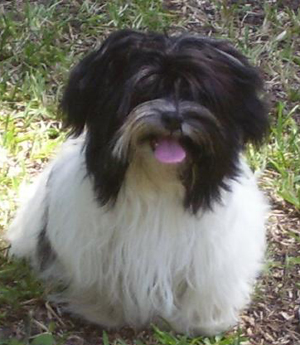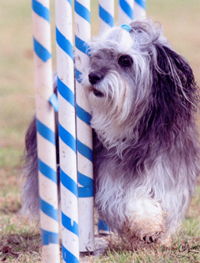 The fundamental goal of Kindergarten Puppy Training (KPT) is to get your dog off to the best possible start in life. The first six months of a puppy's life are the most important months of his life. They are critical to his social development and future well-being. This is the age when the most rapid learning takes place. Everything your pup experiences makes a greater impression on him now than ever will again. You want to capitalize on this critically important time and set the right patterns. At five weeks a puppy's brain is fully developed and he is ready to process what you want him to learn.
The fundamental goal of Kindergarten Puppy Training (KPT) is to get your dog off to the best possible start in life. The first six months of a puppy's life are the most important months of his life. They are critical to his social development and future well-being. This is the age when the most rapid learning takes place. Everything your pup experiences makes a greater impression on him now than ever will again. You want to capitalize on this critically important time and set the right patterns. At five weeks a puppy's brain is fully developed and he is ready to process what you want him to learn.
What Will Your Pup Learn?
In Kindergarten Puppy Training your pup will learn that learning is FUN. You will establish an unbreakable, life-long bond with your puppy. You will learn how to prevent many of the common training errors that most people make, and how to prevent unintentional (and sometimes undesirable) learning on the part of your puppy. You will lay a solid foundation in manners, management and obedience. Your puppy will be eager to learn and you will enjoy living with him.
Choose your Kindergarten Puppy training class carefully. Ideally, the teacher is experienced in positive, no force; rewards based training methods that use treats, praise and toys as rewards. Some teachers are accredited and are members of the American Association of Pet Dog Trainers (AAPDT). Many training programs have a course outline that your teacher should be able to discuss with you. An 8-week course outline may include the following:
· Bite Inhibition Worked on gradually week after
· Taking Treats gently
· Handing Exercises (to familiarize your dog with being touched everywhere)
· Sit"
· Release
· How to "settle"
· "Come"
· Loose leash walking
· "Leave-it"
· Home issues: housetraining, socialization, table manners, grooming and health care, adolescence, continuing education
Typical classes include exercises in game format, and plenty of time for supervised socialization where energy levels of pups are matched up for periods of free-play.
Advantages of Early Training
 Your pup comes to you a blank slate, eager to learn and please. This cooperative attitude makes him easier to teach. Your pup has no established behavior patterns that must be broken. This is the most wonderful time to teach routines and establish a foundation for further training. At 6-8 months your dog will enter a period of development known as the "teens." This has been described as one of the most independent, self-centered, challenging phases of a dog's life. You can see why it is not an ideal time to begin to train. Take advantage of your young pup's agreeable nature and train, train, train! Early socialization helps familiarize your dog with many people and dogs of different size, age, and sex. This develops confidence and will nurture a dog that is comfortable in a variety of social settings.
Your pup comes to you a blank slate, eager to learn and please. This cooperative attitude makes him easier to teach. Your pup has no established behavior patterns that must be broken. This is the most wonderful time to teach routines and establish a foundation for further training. At 6-8 months your dog will enter a period of development known as the "teens." This has been described as one of the most independent, self-centered, challenging phases of a dog's life. You can see why it is not an ideal time to begin to train. Take advantage of your young pup's agreeable nature and train, train, train! Early socialization helps familiarize your dog with many people and dogs of different size, age, and sex. This develops confidence and will nurture a dog that is comfortable in a variety of social settings.
Beware the "cuteness factor." Though your pup is simply adorable in your eyes and in the eyes of everyone with whom he comes into contact, there is nothing more difficult to live with than a poorly behaved dog. Many owners make the mistake of forgiving small dogs behaviors they would not tolerate in a large dog. Establishing good routines early will help you in your daily life with your dog and together you will enjoy the close partnership brought about by early training.
Keep on Training! Once your pup graduates from Kindergarten Puppy Training Classes keep up the training. Keep it fun; remember to reward your dog for positive behaviors. (After all, you wouldn't keep going to work if you did not get a "pay check.") Continue to socialize your dog around a variety of dogs and people. Consider continuing training your dog in agility, novice obedience, or therapy dog work.
